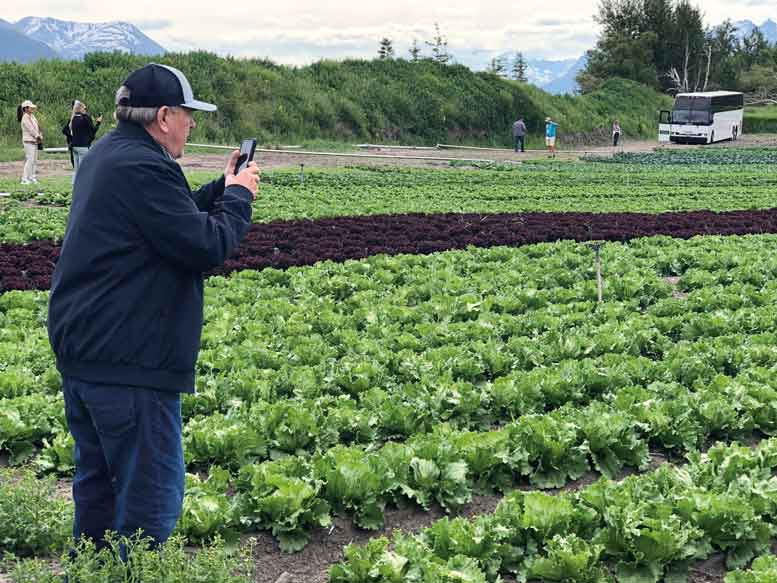|
Click to listen to this article
|
National Onion Association Summer Convention
By Rene Hardwick, National Onion Association
An agricultural crisis brewing in south Texas could have massive ramifications to growers in the United States, and there may be some causes you were not aware of that could affect your bottom line.
While the agricultural industry was recently rocked by the U.S. Farm Bureau’s forecast of a record $32 billion trade deficit this year, it may come as no surprise to growers that one of the reasons cited for the deficit is due to “rising imports of fresh fruits and vegetables.”
Crops can only grow with plentiful water, and to date, the state of Chihuahua, Mexico, is not playing fair in a water sharing treaty negotiated in 1944. So far, that gamesmanship has already cost Texas its 40,000-acre sugar cane industry.
“Be thankful for what you’ve got, but be on the lookout for what’s coming,” said Dale Murden, a grapefruit grower, head of Texas Citrus Mutual (TCM) and a former onion grower in south Texas. He discussed the issue in a keynote address at the National Onion Association’s (NOA) summer convention in Anchorage, Alaska. He has been fighting this battle for more than 20 years.

Deliveries in Dispute
Mexico officials have said shrinking water supplies have kept them from delivering the water.
In recent years, however, Chihuahua’s onion output has increased 321 percent. In 2022, the U.S. was a net importer of onions, with $451 million in onion imports from Mexico, according to Observatory of Economic Complexity (OEC) World. That represented more than half of the U.S.’s onion import market.
“Chihuahua is using that water to grow crops such as pecans and onions in the desert that are then exported to the U.S.,” explained Dante Galeazzi, CEO of Texas International Produce Association (TIPA). “These are two crops grown in Texas. Now, not only are Texas farmers largely unable to grow these crops, but they are also in competition with a foreign producer that is essentially using our own water to compete against them.”
To date, Mexico owes the United States more than 876,000 acre-feet of water, due to years of non-deliveries. Mexico has used that water to turn a desert into an oasis, Murden said, growing several water-intensive crops, including record numbers of onions. OEC reports that in April 2024, Mexican onion imports to the U.S. grew by 11.2 percent.

While the situation has mostly affected Texas growers, the rest of the country should heed this growing concern, Murden said.
Mexico has bypassed the deliveries by claiming the exception of “extreme drought,” then waiting for a hurricane or other weather event to provide the water in the international reservoirs along the Rio Grande. Yet, what the U.S. Department of State has failed to understand in all these years since the treaty was created in 1944, is that Mexico, which had three reservoirs at the time, increased its storage capacity since then by adding eight more reservoirs, Murden said. Murden showed several satellite pictures of large reservoirs in Chihuahua from recent years to demonstrate just how much water the country had before this summer.
Officials from both sides “negotiate” issues involving the water crisis through “minute orders” in the treaties. These “minutes” are essential amendments to the treaty. Murden pointed out that in just two of these “minutes” in recent years, the U.S. gave Mexico $31.5 million (in 2017) to develop conservation projects due to concerns over an earthquake and potential water delivery issues. In a new “minute” negotiated in March 2024, the U.S. agreed to pay Mexico $65 million for the U.S. being short on its water delivery commitment to Mexico from the Colorado River.
“Mexico has never willingly made a payment on the Rio Grande,” Murden said. “But we (United States) always jump to do the right thing first … but sometimes, things don’t add up. Folks, the U.S. Farm Bureau forecast a $32 billion trade deficit in 2024, and we do stuff like this.”
In 2022, Chihuahua had the highest onion production in Mexico, producing 647 million pounds, or 15 percent of Mexican onion production, according to Murden’s research. That led to $88 million in profit, up 321 percent from 2020. From 2000 to 2022, Chihuahua alone increased its onion acreage 73 percent to 14,786 acres, Murden reported.
“That’s the tale of two treaties and two worlds; they’re killing us,” Murden said.

Discussions in D.C.
Administrations from both sides of the aisle have let this issue continue, Murden acknowledged. He said the U.S. Department of State is the place to really get action done, but nothing ever happens.
“In the State Department’s world of treaty negotiations, the tool of choice is the ‘minute order,’” Murden explained. “They don’t change a treaty; they just negotiate a ‘minute.’ The ironic reality is these ‘minutes’ have zero teeth. If one side doesn’t want to comply, no harm, no foul. But this is how diplomats work; they’ll rah rah, do their thing, tell you about it, then slap each other on the back.”
In recent months, TIPA, TCM and NOA officials have gone to Washington D.C. to discuss the situation and have made little progress in getting Department of State officials to act. Their next path is through Congress.
So far, U.S. Rep. Monica De La Cruz (R-Texas) helped sponsor Senate Bill 2969 last fall and it was referred to the Committee on Foreign Relations. An identical resolution, H.R. 7468, was introduced to the House on Feb. 8, 2024, and referred to the House Committee on Foreign Affairs. There has been no action taken on either side of Congress, however, as the bills have not made it out of committee.
Meanwhile, U.S. Rep. Lauren Boebert (R-Colo.) has jumped into the discussion, co-sponsoring the legislation and sending a press release urging action.

NOA Executive Vice President Greg Yielding was quoted in the press release: “Without the consistent water needed to grow crops as mandated by the 1944 treaty, agriculture producers across Colorado and the United States are in danger of being forced out of the marketplace and closing down their livelihoods.”
Joe Petrocco, a Colorado onion grower and vice president of the Colorado Fruit & Vegetable Growers Association, also chimed in: “These unfair water practices are further compounded when you consider Mexico doesn’t have the same safety standards and regulations, giving their producers other competitive advantages.”
But it will take much more to turn the heads of those in the Department of State, Galeazzi said.

“We need more people from all walks of life to be aware of what’s happening,” Galeazzi said. “We need more people to understand the impact of this issue. It’s not only onions, either, but things like pecans, beef and many other agricultural sectors are in existence using this water. And because Chihuahua has held back this water, it is not only endangering the livelihoods of thousands of Texas agricultural jobs, but also impacting the lives of normal citizens in both the U.S. and Mexico. Nearly 2 million people on both sides of the border are facing a water shortage crisis that should not exist if everyone were following the rules set forth and agreed upon in the 1944 treaty.”



